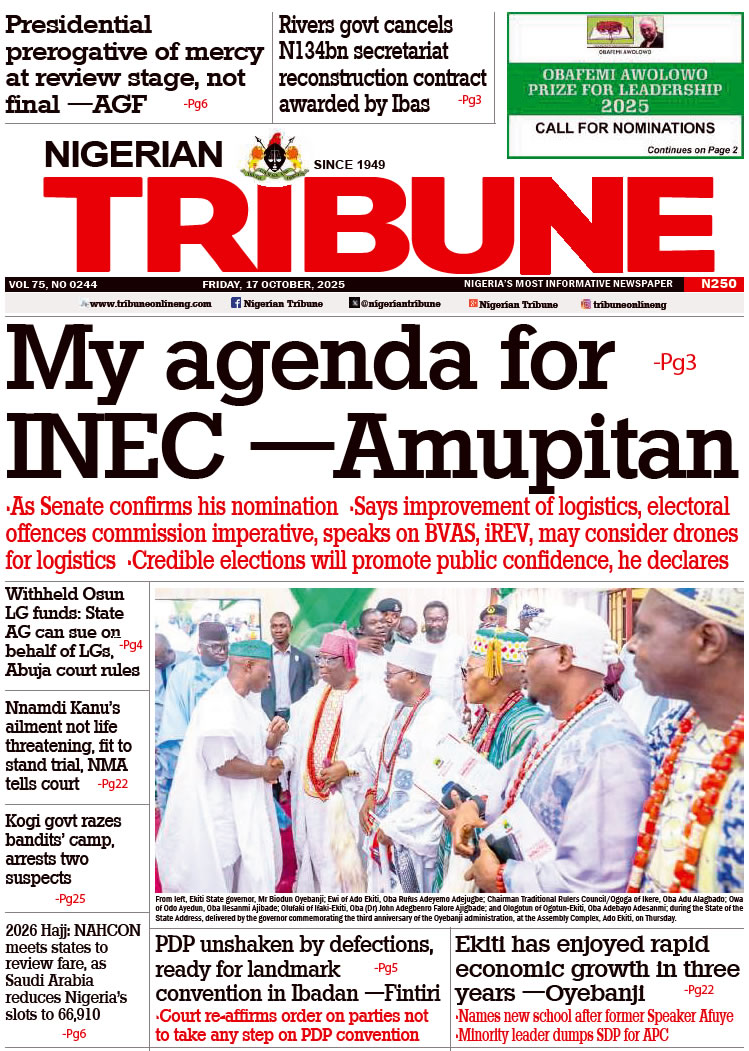Ashleigh Plumptre is calm, thoughtful, and fiercely proud of the jersey she wears. From playing youth football for England to becoming one of Nigeria’s most beloved Super Falcons, her journey is more than just football; it’s about identity, purpose, and heart. She speaks with DOYIN ADEOYE about her career, the fire behind Nigeria’s comeback at WAFCON, and why using her voice off the pitch matters just as much as her presence on it.
You’ve lived and played in different countries; England, USA, Nigeria, and now Saudi Arabia. What’s it been like adjusting to these very different cultures on and off the pitch?
Playing in different countries has allowed me to learn more about myself. It is an adjustment every time you move to a different country, but I’ve always tried to open myself up to my environment, and come in with an open mind and open heart, and by doing so, it helps me connect with people in a deeper way.
That has allowed me to learn more about what I care about, and interact with so many different people, especially in Saudi, USA and England. And hopefully the case in Nigeria soon. By connecting with young people from different backgrounds and cultures, it helps me to identify with them, and identify different parts of myself I wasn’t aware of before. And this helps me more on the pitch, because when I’m able to connect with the people that I’m around, then I feel more comfortable on the pitch because they have a level of trust in me, and I have a level of trust in them. So it helps with camaraderie on the field.
You played for England at youth level but chose to represent Nigeria at the senior level. What pushed you to make that decision, and what has it meant to you personally?
I enjoyed the very valuable time playing with England in the youth age groups, but what pushed me to play for Nigeria was asking myself the question; what do I want to do with football?
This happened during the covid era, when I spent more time with my sister. And she spoke about wanting to know about our heritage. So it was more of a journey for me to learn more about our culture based on her provoking that in me because of her interest. And what representing Nigeria means to me is beyond words. I’ve been out to identify the part of my heritage that I’ve never really been able to delve into before, and also be a representation of other young people, especially mixed race people, who need to identify with being here nor there, but feel connected to two different cultures.
Nigerians have shown you so much love since you joined the Super Falcons; from social media to the streets. How does that kind of support make you feel, and what does it mean to you personally?
The support from fans means the world. I always say it’s bigger than me. I know who I’m representing and, even being in Nigeria currently and seeing what it means to Nigerians for us to be Champions says a lot.
I didn’t actually realize the extent of what it meant to people, until I came here. Though I always knew it meant a lot based on the amount of fan love I’ve received, and being at AFCON and seeing all the fans celebrating, to actually be here and realize how much it means, is just incredible.
How has representing Nigeria shaped your understanding of your roots and identity?
I’ve always had a connection to Africa generally. I’ve always had an interest in wanting to visit Africa as a continent, even before I represented Nigeria. And being able to represent Nigeria as a country has allowed me to realize that I don’t have to be born here to really know what it means to have Nigerian in my blood.
As part of my personality, I’ve always been very hard-working, and able to push myself beyond boundaries. And when I started playing with the super Falcons, I felt the drive, the hard work, that innate passion to push myself beyond boundaries being reflected in all the ladies I was around playing with.
You signed for Al-Ittihad in 2023 and extended your contract until 2027. What drew you to the Saudi League, and how has your experience been so far?
I’m excited to get back to Jeddah and see my team after this celebration with Nigeria. I was drawn to the Saudi League because of the people. I’m a big believer in connecting with like-minded people who have similar values.
My experience so far has been good. I’ve been faced with challenges while being on the team, and that is what I’ve always wanted in football. I have a bigger role than just turning up and playing. I know that I’m responsible for being a good example to some of these girls, sharing some of my experience, and also learning from them.
How different was the vibe at the concluded WAFCON tournament compared to others like the World Cup?
The vibe is different to other competitions in terms of fanbase. In African football, the way fans support the team is really admirable. There’s a different level of sound, love, dancing and deep passion that you can see with the way fans celebrate, and that is reflected in the passion that you see on the field, as every team is ready to give it their all.
You helped Nigeria keep three clean sheets at the 2023 Women’s World Cup, what do you credit that solid defensive performance to?
Yes. We kept clean sheets throughout the group stage and in the qatar final. We didn’t concede a goal until the semi-final, which was a penalty. So one thing that we are very good at is our defensive record. Defensively, we’re a very good team. But I would give the credit for the solid defensive performances at the World Cup and AFCON not just to us as defenders or the goalkeeper, but as a team. We have a tenacity to want to win the ball back as quickly as we can, and that’s evident in every player, whether you’re a striker, a midfielder, defender or goalkeeper.
You’ve taken on some youth coaching roles. Is that a passion you see growing after your playing career, or a way to give back while you’re still on the pitch?
I don’t really know what happens after my playing career, but I really enjoy being part of play development, because football is like a tool. I like being around kids because they’re more malleable. For them, it’s more like a hobby, so it’s nice to be around them, and hopefully encourage them to understand that it should always be a hobby whether they turn professional or not.
You are a global ambassador for Mission 89, a leading organization fighting against young athlete trafficking and exploitation. What drew you to this cause and what this role means to you?
I’m very passionate about Mission 89. I was drawn to it during my time of surgery and rehab last year. I watched a movie called ‘The Sound of Freedom’ which was about human trafficking and it deeply moved and upset me to a point where I felt the need to do something, and use my platform to speak about this, especially in sports. It is a big issue that is not popular enough.
The role means a lot to me because I know not so many professional athletes speak about it. So I know the weight it carries for me to be involved and to use my voice to hopefully have an influence on such an issue.
You’ve spoken at major UN-related events alongside diplomats and experts. How has participating in those forums shaped your advocacy?
It was a real honour to be invited to the UN to speak. I realised that even though I can use my platform, and while people are connected through social media, it’s important to be in the room to connect with people who actually have an influence on policy making. So if I can introduce myself to these people, tell them why I care about this and inform myself as much as I can about the issue alongside these people, I think it will hopefully have more of a lasting impact.
Off the field, how do you unwind or treat yourself after a tough match or training session?
I like to treat myself after a tough match or training session. I like peace. I like to spend time with myself. I like to be in nature; I love food so much, so I treat myself to really nice food, good music, and being in nature. I like sun by the beach or any kind of nature; greenery; mountains, or anything of sort.
What’s the one song that always gets you hyped before a game?
I always change my music depending on how I feel about a game. I listen to slow music sometimes, I even listen to music without lyrics, but I think one of the most influential songs I listen to quite often and always before a game is Bigger by Beyonce, as I find the lyrics incredibly powerful and it resonates with me a lot.
If you weren’t playing football professionally, what do you think you’d be doing instead?
I studied Human Biology at the university. I’ve always wanted to go to medical school. I’ve always been fascinated in health care; I like dealing with people and I find the human body fascinating. So I definitely will be in healthcare.
You’re part of a generation helping to put African women’s football on the global stage. What kind of example do you hope to set for many young girls in Nigeria and beyond looking up to you?
Long before I was here, there’s a legacy that Nigerian women’s football left in itself. I mean this is obviously our 10th African title, so some of these women have been laying the foundation for the next generations. So for me, I just hope that many young girls in Nigeria feel connected to our success and know that with the right support and protection and pathways, they can have the chance to achieve some really good things. Sometimes it doesn’t doesn’t have to be about winning championships, it’s about the power of support, which reveals more about who we are, how we connected to other people, and how important team work is.
ALSO READ FROM NIGERIAN TRIBUNE: Strike not yet suspended, Nurses dismiss minister’s claim
That final game was down 2–0 at halftime, then winning 3–2. What shifted at the break?
The first half was pretty difficult for us; we just weren’t finding our momentum going forward, and I think that came from the fact that we were pretty defensively minded. We know our capabilities when we press teams and when we don’t give them a lot of time. So after the half time, we said to ourselves that we would limit the opportunity Morocco can have, by just limiting the time and space they have on the ball. So collectively, we were able to do that, and it had a knock-on effect on each other.
Was there a moment when you knew the game was turning in the team’s favor; like, “Yeah, we’ve got this”?
When the second half started, I noticed that even though we just had to break Morocco, a lot of the girls on their team looked quite fatigued, and especially when we were winning the ball high off the field and possessing the ball in their final third. I felt like we just needed one chance and to catapult the second half into action for us. And that happened when we got the penalty call, which just completely changed the momentum of the game for us.
WATCH TOP VIDEOS FROM NIGERIAN TRIBUNE TV
- Relationship Hangout: Public vs Private Proposals – Which Truly Wins in Love?
- “No” Is a Complete Sentence: Why You Should Stop Feeling Guilty
- Relationship Hangout: Friendship Talk 2025 – How to Be a Good Friend & Big Questions on Friendship
- Police Overpower Armed Robbers in Ibadan After Fierce Struggle






